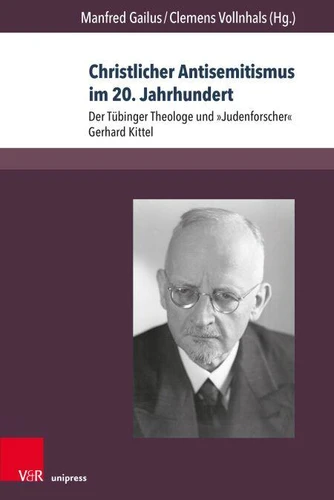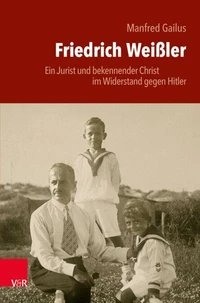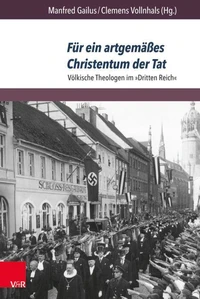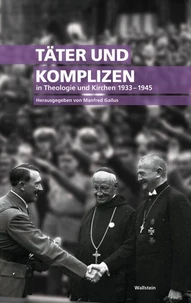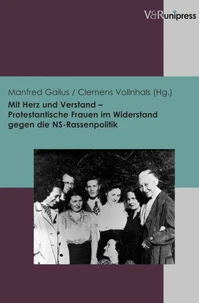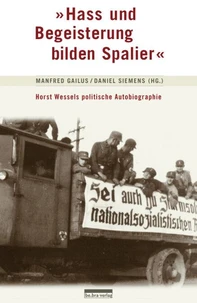Christlicher Antisemitismus im 20. Jahrhundert. Der Tübinger Theologe und »Judenforscher« Gerhard Kittel
Par : , , , ,Formats :
Disponible dans votre compte client Decitre ou Furet du Nord dès validation de votre commande. Le format PDF est :
- Compatible avec une lecture sur My Vivlio (smartphone, tablette, ordinateur)
- Compatible avec une lecture sur liseuses Vivlio
- Pour les liseuses autres que Vivlio, vous devez utiliser le logiciel Adobe Digital Edition. Non compatible avec la lecture sur les liseuses Kindle, Remarkable et Sony
 , qui est-ce ?
, qui est-ce ?Notre partenaire de plateforme de lecture numérique où vous retrouverez l'ensemble de vos ebooks gratuitement
Pour en savoir plus sur nos ebooks, consultez notre aide en ligne ici
- Nombre de pages276
- FormatPDF
- ISBN978-3-8470-0996-2
- EAN9783847009962
- Date de parution11/11/2019
- Protection num.pas de protection
- Taille3 Mo
- Infos supplémentairespdf
- ÉditeurV&R Unipress
Résumé
Gerhard Kittel (1888-1948) wurde 1926 als Nachfolger Adolf Schlatters an die Universität Tübingen berufen und zählte als Herausgeber des »Theologischen Wörterbuchs zum Neuen Testament« zu den bekanntesten Theologen seiner Zeit. 1933 trat er der NSDAP bei und verfasste mit seiner Publikation »Die Judenfrage« eine der einflussreichsten protestantischen Stellungnahmen, die in geradezu exemplarischer Weise für die Verknüpfung und Verschmelzung von christlichem Antijudaismus und völkischem Antisemitismus steht.
Seit 1936 arbeitete Kittel zudem aktiv in Walter Franks Münchener Reichsinstitut für Geschichte des neuen Deutschlands (Forschungsabteilung Judenfrage) mit. Der Band analysiert in neun Beiträgen Biografie und Karriere Gerhard Kittels, seine Schriften und Netzwerke. Ferner enthält er eine ausführliche Vita und Bibliografie Kittels. Gerhard Kittel (1888-1948) took over the chair of Adolf Schlatter at the University of Tübingen in 1926.
He was the editor of "Theologisches Wörterbuch zum Neuen Testament" (Theological Dictionary of the New Testament) and one of the most popular theologians of his time. He joined the Nazi Party in 1933 and published his work "Die Judenfrage" (The Jewish Question), one of the most influential Christian statements and an example of the connection and mergence of Christian anti-semitism and folkish anti-semitism.
In 1936, he began working in the department of "The Jewish Question" of Walter Frank's Reichsinstitut für Geschichte des neuen Deutschlands (Reich Institute for History of the New Germany). The nine contributions of this volume not only analyse his biography and career but also his works and networks. Furthermore, the volume also includes Kittel's comprehensive vita and bibliography.
Seit 1936 arbeitete Kittel zudem aktiv in Walter Franks Münchener Reichsinstitut für Geschichte des neuen Deutschlands (Forschungsabteilung Judenfrage) mit. Der Band analysiert in neun Beiträgen Biografie und Karriere Gerhard Kittels, seine Schriften und Netzwerke. Ferner enthält er eine ausführliche Vita und Bibliografie Kittels. Gerhard Kittel (1888-1948) took over the chair of Adolf Schlatter at the University of Tübingen in 1926.
He was the editor of "Theologisches Wörterbuch zum Neuen Testament" (Theological Dictionary of the New Testament) and one of the most popular theologians of his time. He joined the Nazi Party in 1933 and published his work "Die Judenfrage" (The Jewish Question), one of the most influential Christian statements and an example of the connection and mergence of Christian anti-semitism and folkish anti-semitism.
In 1936, he began working in the department of "The Jewish Question" of Walter Frank's Reichsinstitut für Geschichte des neuen Deutschlands (Reich Institute for History of the New Germany). The nine contributions of this volume not only analyse his biography and career but also his works and networks. Furthermore, the volume also includes Kittel's comprehensive vita and bibliography.
Gerhard Kittel (1888-1948) wurde 1926 als Nachfolger Adolf Schlatters an die Universität Tübingen berufen und zählte als Herausgeber des »Theologischen Wörterbuchs zum Neuen Testament« zu den bekanntesten Theologen seiner Zeit. 1933 trat er der NSDAP bei und verfasste mit seiner Publikation »Die Judenfrage« eine der einflussreichsten protestantischen Stellungnahmen, die in geradezu exemplarischer Weise für die Verknüpfung und Verschmelzung von christlichem Antijudaismus und völkischem Antisemitismus steht.
Seit 1936 arbeitete Kittel zudem aktiv in Walter Franks Münchener Reichsinstitut für Geschichte des neuen Deutschlands (Forschungsabteilung Judenfrage) mit. Der Band analysiert in neun Beiträgen Biografie und Karriere Gerhard Kittels, seine Schriften und Netzwerke. Ferner enthält er eine ausführliche Vita und Bibliografie Kittels. Gerhard Kittel (1888-1948) took over the chair of Adolf Schlatter at the University of Tübingen in 1926.
He was the editor of "Theologisches Wörterbuch zum Neuen Testament" (Theological Dictionary of the New Testament) and one of the most popular theologians of his time. He joined the Nazi Party in 1933 and published his work "Die Judenfrage" (The Jewish Question), one of the most influential Christian statements and an example of the connection and mergence of Christian anti-semitism and folkish anti-semitism.
In 1936, he began working in the department of "The Jewish Question" of Walter Frank's Reichsinstitut für Geschichte des neuen Deutschlands (Reich Institute for History of the New Germany). The nine contributions of this volume not only analyse his biography and career but also his works and networks. Furthermore, the volume also includes Kittel's comprehensive vita and bibliography.
Seit 1936 arbeitete Kittel zudem aktiv in Walter Franks Münchener Reichsinstitut für Geschichte des neuen Deutschlands (Forschungsabteilung Judenfrage) mit. Der Band analysiert in neun Beiträgen Biografie und Karriere Gerhard Kittels, seine Schriften und Netzwerke. Ferner enthält er eine ausführliche Vita und Bibliografie Kittels. Gerhard Kittel (1888-1948) took over the chair of Adolf Schlatter at the University of Tübingen in 1926.
He was the editor of "Theologisches Wörterbuch zum Neuen Testament" (Theological Dictionary of the New Testament) and one of the most popular theologians of his time. He joined the Nazi Party in 1933 and published his work "Die Judenfrage" (The Jewish Question), one of the most influential Christian statements and an example of the connection and mergence of Christian anti-semitism and folkish anti-semitism.
In 1936, he began working in the department of "The Jewish Question" of Walter Frank's Reichsinstitut für Geschichte des neuen Deutschlands (Reich Institute for History of the New Germany). The nine contributions of this volume not only analyse his biography and career but also his works and networks. Furthermore, the volume also includes Kittel's comprehensive vita and bibliography.

